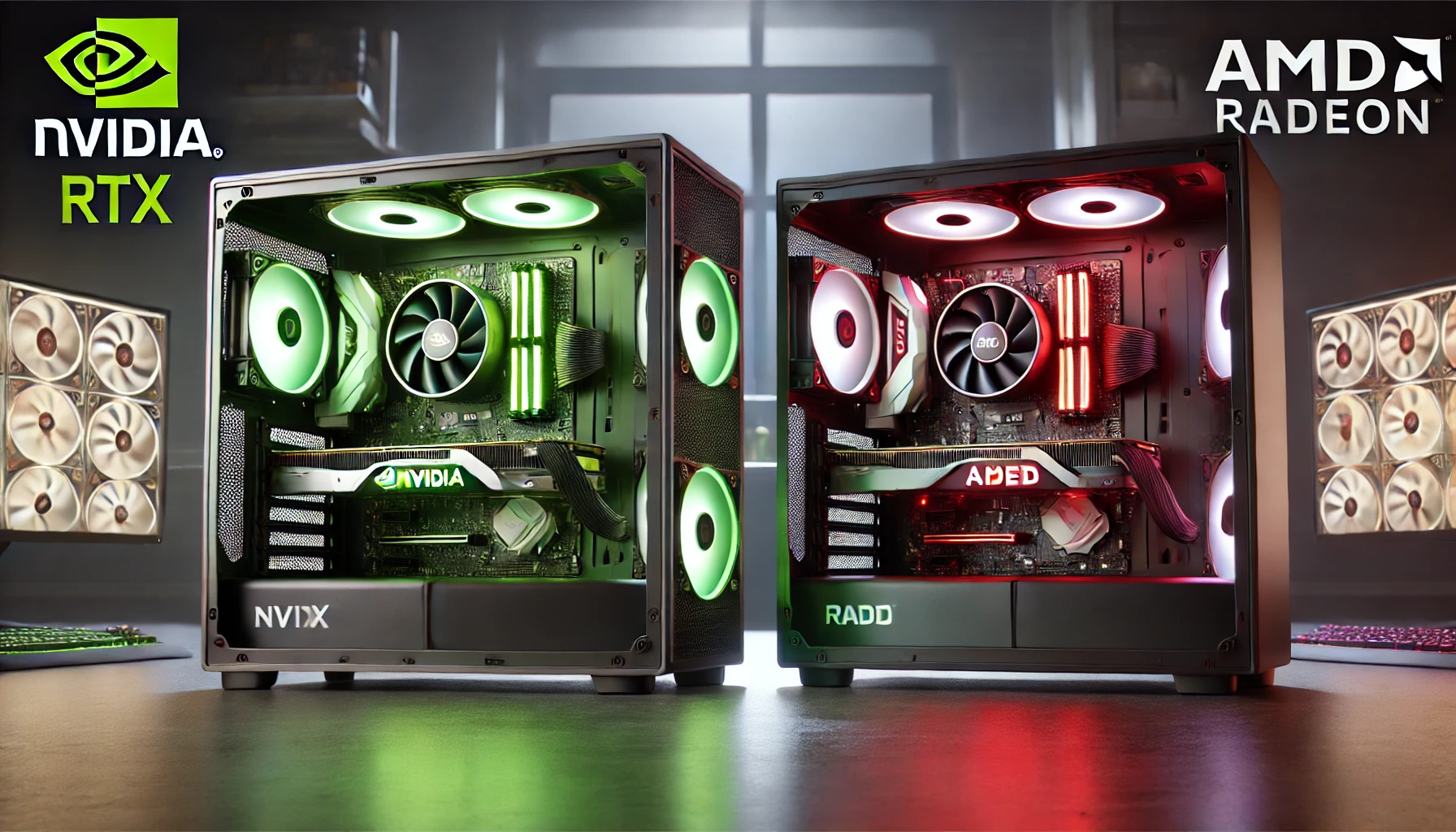When building or upgrading a gaming PC in 2025, one of the biggest decisions you’ll face is choosing between NVIDIA and AMD graphics cards. Both brands offer high-performance GPUs across a range of price points, and the competition is tighter than ever. So how do you decide which one offers the best value for your gaming and creative needs?
This guide compares NVIDIA and AMD GPUs in terms of performance, pricing, features, software, and future-proofing, helping you choose the best card for your budget and goals.
1. Performance Comparison: Gaming Benchmarks (1080p & 1440p)
Here’s how some of the most popular cards from both brands stack up in real-world gaming scenarios:
| GPU | Average 1080p FPS | Average 1440p FPS |
|---|---|---|
| NVIDIA RTX 4060 | 120–160 FPS | 90–120 FPS |
| AMD RX 7600 | 115–150 FPS | 85–110 FPS |
| NVIDIA RTX 4070 | 140–190 FPS | 100–140 FPS |
| AMD RX 7700 XT | 135–185 FPS | 95–135 FPS |
| NVIDIA RTX 4080 Super | 180–220 FPS | 140–180 FPS |
| AMD RX 7900 XTX | 175–210 FPS | 135–175 FPS |
💡 NVIDIA has a small edge in ray tracing and DLSS performance, while AMD often offers better raw FPS per dollar in rasterized gaming.
2. Price-to-Performance Ratio
AMD GPUs typically provide more frames per dollar, especially in the mid-range segment.
| Card | Avg. Price (USD) | Value Tier |
|---|---|---|
| AMD RX 7600 | ~$270 | Great value for 1080p |
| NVIDIA RTX 4060 | ~$299 | Slightly more expensive |
| AMD RX 7700 XT | ~$449 | Strong 1440p card |
| NVIDIA RTX 4070 | ~$549 | More features, less value per frame |
💡 If you’re building on a budget, AMD generally offers better raw performance per dollar. But for premium experiences, NVIDIA has more features (more on that below).
3. Ray Tracing & Upscaling (DLSS vs. FSR)
🌟 NVIDIA Technologies:
- DLSS 3 / 3.5 (AI frame generation)
- Better ray tracing hardware
- Reflex for latency reduction
- RTX Voice and Broadcast tools
🔥 AMD Technologies:
- FSR 3 (open-source upscaling)
- Good ray tracing, but not as fast as NVIDIA
- Smart Access Memory (SAM) for AMD CPU + GPU combos
- Anti-Lag+ for reduced latency
💡 NVIDIA is better for ray tracing and AI-based upscaling, while AMD’s FSR works on more hardware, including older GPUs.
4. VRAM and Future-Proofing
✅ VRAM Comparison (2025 Mid-Tier Cards):
| GPU | VRAM |
|---|---|
| RTX 4060 | 8GB |
| RX 7600 | 8GB |
| RTX 4070 | 12GB |
| RX 7700 XT | 12GB |
| RX 7900 XTX | 24GB |
| RTX 4080 Super | 16GB |
💡 More VRAM doesn’t always mean better performance today — but games in 2025+ are using more VRAM, especially in 1440p/4K and modded games. AMD cards tend to have more VRAM at each price point.
5. Drivers, Software, and Ecosystem
🔧 NVIDIA Software & Drivers:
- Game Ready Drivers = frequent updates
- GeForce Experience: simple recording, updates, performance tuning
- Stable and optimized for most new releases
🔧 AMD Software & Drivers:
- Adrenalin software: powerful, clean, customizable
- Great recording, tuning, and performance monitoring tools
- Historically had more bugs, but has greatly improved in recent years
💡 NVIDIA has a slight edge in driver maturity, but AMD has caught up fast, especially in 2024–2025.
6. Streaming, Content Creation, and AI Tasks
- NVIDIA cards have superior NVENC encoders — better for Twitch, YouTube, OBS, and video editing
- Better support for AI workloads and CUDA-based apps (e.g., Blender, Stable Diffusion)
- AMD is catching up, but still behind in content creation flexibility and third-party software support
💡 If you stream, edit, or do AI rendering — NVIDIA is the better investment.
7. Power Efficiency and Cooling
| Brand | Efficiency | Thermal Design |
|---|---|---|
| NVIDIA | Very efficient (especially Ada Lovelace) | Cooler and quieter |
| AMD | Slightly higher power draw | Still efficient — recent designs much improved |
💡 Both brands offer quiet and efficient GPUs, but NVIDIA cards generally run cooler at the same performance level.
8. Best GPU Picks by Use Case (2025)
| Use Case | Best GPU |
|---|---|
| Budget 1080p Gaming | AMD RX 7600 |
| Mid-Range 1080p/1440p | NVIDIA RTX 4060 or AMD RX 7700 XT |
| Competitive eSports | NVIDIA RTX 4060 or AMD RX 7600 |
| Content Creation + Gaming | NVIDIA RTX 4070 or higher |
| Max Settings + 4K Gaming | AMD RX 7900 XTX or NVIDIA RTX 4080 Super |
Final Thoughts: NVIDIA or AMD?
✅ Choose NVIDIA if:
- You want the best ray tracing and DLSS performance
- You do streaming, video editing, or AI rendering
- You value cool, quiet operation and driver stability
- You’re gaming at 1440p or higher with RTX features enabled
✅ Choose AMD if:
- You want more performance per dollar
- You’re focused on raw rasterization performance
- You care about future-proof VRAM
- You’re building an all-AMD system for Smart Access Memory benefits
🎯 Bottom Line:
In 2025, both NVIDIA and AMD offer excellent GPUs. The best value depends on your needs:
- Gamers on a budget: AMD
- Competitive players or content creators: NVIDIA
- Balanced users: Choose based on deals, availability, and specific software needs
Whichever you pick, you’re getting a powerful card — just make sure it fits your use case and budget.
